- Home
- Mary Anne Kelly
Jenny Rose
Jenny Rose Read online
The author and publisher have provided this e-book to you for your personal use only. You may not make this e-book publicly available in any way. Copyright infringement is against the law. If you believe the copy of this e-book you are reading infringes on the author’s copyright, please notify the publisher at: us.macmillanusa.com/piracy.
Contents
Title Page
Copyright Notice
Dedication
Acknowledgments
Prologue
Chapter One
Chapter Two
Chapter Three
Chapter Four
Chapter Five
Chapter Six
Chapter Seven
Chapter Eight
Chapter Nine
Chapter Ten
Chapter Eleven
Chapter Twelve
Chapter Thirteen
Also by Mary Anne Kelly
Copyright
For Ruth Cavin,
who gave me my shot
Acknowledgments
Thanks to my sister Annie,
for insisting I meet her in Ireland,
to Firefighter Tommy Foy,
who gave me the story idea,
to Otto Penzler,
for keeping me afloat,
and
to Judy Chase,
for teaching me to cut and paste.
Prologue
It was a dark and stormy night, far away and south of Cork. As south as you can be without falling into the black water itself. A woman hurried along the tall hedge path to the whitewashed house. It lit up with the moon when the clouds went racing by. She called to the dog but the dog wouldn’t come, frantic from the thunder or something. The woman went to the shed out in the back—it was no distance at all—then she took the kerosene barrel and heaved it to her hip and went into the house with it. She went in the back way. “Brownie!” she called again. The house was all shadows. And cold. She fumbled at the mud-room shelf for the sticks of matches and found them, lots of them, dry and ready in the Champs Élysées cylinder. She put some in her pocket. Into the kitchen she went, lugging the great thing, glad to be out of the rain. She took her time filling the stove, never spilling a drop, emptying the drum. The cat came silently up behind her and she went stiff with fright. “Oh, it’s you,” she said, pulling a match from its box. Then, out the window she noticed that girl, Jenny Rose, up the runny bracken on the hill. What a night to be out, she thought, even for her! The cat slinked around her ankles and she put the match in her teeth, picked up the cat with distaste, opened the door, threw it out onto the pebbly drive and shut the door. There was something wrong with that cat. “Lavender blue, dilly dilly,” she sang for no reason. She turned around and lit the match. The room, the house and she blew up. It was so quick that her thoughts were left without her there, still with the last of the house and the blue, teeming rain.
Chapter One
I was sitting in the kitchen with my mother and my sisters when the telephone rang. “You get it, Zinnie,” Mom said, talking to my younger sister, the cop.
Carmela picked up the phone. Carmela, my older sister, always has to be in control. “Heddo,” she actually said.
Zinnie raised her eyes and we exchanged looks. Carmela’s affectations are a never dwindling source of hoopla to us.
Carmela hung up. “No one there.” She peeled a basil leaf from its stalk and fluttered it onto the platter of other poetically placed basil leaves. Carmela is the beauty. Zinnie is too small and I am too big but Carmela is excruciatingly just right. She is, at the moment, a feminist playwright. Zinnie is a damn good cop and I am a black and white photographer. Or was. All grown women. I’d just come down the stairs. “What took you so long?” my mother asked.
“Nothing,” I shrugged. Upstairs, I’d fallen onto my childhood bed and left the building. A church clock in Shwabbing chimed the hour while I pulsed. Somebody’d lowered me secretly onto a davenport and crept like sachet underneath my white bra. We’d held each other’s eyes, both pleased. The memory of his Zigaretten breath, both of us unmarried but haggard and excited and he in a hurry, furry leg across my thigh. I’d detained his impatience. It glowed so around him and the smell, like moss and then the thing itself, exquisite as the head of a fox, separate from worry, just poised, his Gaelic words all up in breathless arms against my ready ear and then the moment when it reached my legs and bumped them, kissed the lips with one insistent bruise, the moment right before, where now he had to lower my lace and elastic to get it angled, to get it in … the helpless look in his busy eyes, the snatch of unlocked want, green and loose from the lowered lids. I came with a happy, silent shudder before I knew what hit me and got up, slidy as taffeta and, not daring to reflect, walked down the stairs, mahogany banister holding my hand, still singing inside with the shadow of my bliss, my lonely, only sin of a bliss.
“It’ll ring again, you wait,” our mother, Mary Breslinski, said. She, being from the old sod itself, is often right about these things and so we kept our ears cocked, you’ll excuse the expression. Mary had us taking turns grinding the basil leaves in her great big mortar and pestle. A purist, our mother. Anyone else would have thrown them into a food processer but not our mom. Sort of a mixture of food guru and Roman Catholic gladiatrix but with her it works. Her meals are always too much. I know they’d kept my marriage intact. And Zinnie’s ex-husband is over as often as he can manage, plundering recipes for his restaurant. Zinnie was whacking away at the dishtowel-swaddled walnuts and pignolis with a good fruitman’s hammer. My job was the garlic because I didn’t have to deal with the public the next day.
Mary was telling the story. “There we were,” she said, locking eyes with all three of her daughters before moving on. She had our attention for once, having very nearly died the week before. Her fingers splayed across the kitchen table. Her Irish eyes twinkled with the all-knowing squint of the rethroned mahatma. “Up on the eighth floor of the hospital in Flushing. It was Claire and me and the heart doctor, who just come in.”
I smiled—I’m Claire. “He happened to be a very nice doctor,” I said.
“Not in a rush,” Mary said.
“So get on with the story already,” Zinnie said. Zinnie the detective wanted only the facts, thank you, ma’am.
“Well. Behind the doctor there’s this huge, clean window. New. From the radiator straight up to the ceiling. What they didn’t do to spruce up that old hospital!”
Carmela shifted threateningly in her chair. We were all afraid of Carmela, our daunting, professional beauty with her black hair, blue eyes, and white skin. She wears only silk or cashmere, depending upon the weather. Today she wore silk. One always had the feeling Carmela had more important places to be.
“You want me to make you a Turkish coffee?” I asked her.
“I want to hear the story.”
“So there we are,” Mary continued obediently. “Claire is paying strict attention to the doctor’s orders. She’s writing some of it down and all when suddenly her mouth flies open … Oh, by the way, Claire, did you take the names down of all the medications?”
“To make a long story short.” Zinnie’s arms went up.
“Outside,” I took over, “the sky is blue. Along swoops, then hovers, an eagle. An eagle! In his talons is a silver fish. It glitters in the sunshine. ‘Look!’ I point. ‘Look!’ ‘My God,’ they say, ‘Look at that! What is it? Where did he get that fish, from the East River?’” I leaned forward in my chair. “Right away I think of all the Korean restaurants in the area. Some wide-open Dumpster? But this fish seems so alive. Is so alive!”
“It couldn’t possibly have been an eagle.” Carmela shook her head knowingly. “It was a falcon. There are falcons in New York. They discovered one recently on
a skyscraper. And one on a bridge. The Verrazano, I think.”
“Oh, no, this really was an eagle!” I insisted.
“Are you sure you’re not making this up?” Carmela said.
“Don’t even dignify such an insulting question with a reply,” Zinnie advised. We’d both been reared in the dust of Carmela’s quake.
“It’s just the sort of thing you might want to have happen,” Carmela continued disparagingly. “That’s all I mean. So symbolic.” Nor is Carmela hindered by any eagerness to please.
“I beg your pardon,” I said. “Mommy was there.”
Carmela dismissed this with a skeptical, all-knowing elevation of brow.
“Whatever it was”—Mary shushed us—“it was like a miracle up there in the sky. It was a sterling sight!”
Taken aback, I looked at my mother. She knew it really had been an eagle. Why was she letting it be less?
“Flushing Meadow Park,” Zinnie said. “That’s where he must have gotten the fish. That lake there.”
“The East River isn’t really that far, if you’re a falcon,” Carmela said.
I sat there sullenly, braiding and unbraiding my heavy lot of rusty hair. The bananas in the bowl had had their day and their strong smell took over. Where the eagle had come from, I brooded, wasn’t even the appropriate question. It was, after all, my eagle. I had seen him and he had seen me. Why had it been there, that was the question. As for Carmela’s accusation, well, yeah, it was true I’d spent plenty of time happily puzzling over the Eastern philosophies. And any eagle sighting would well connote an auspicious moment. But like all auspicious moments, I was learning to suspect, they were better off kept to one’s self. I braided my hair one last time and locked it up good in a five-and-ten purple elastic.
Mary took a sip of the herbal tea we’d insisted she drink. She stroked the embroidery on the cloth we’d put on for her homecoming. She would be the one to wash and iron it. Still, she was alive to do it. I knew what she was thinking. Trust Carmela to take the joy out of everything. She had the knack, did Carmela. And no matter how she looked at it, Mary always wound up blaming herself for that. Something she’d done wrong when she was bringing us all up. Something to do with giving Carmela so much attention, her undivided adoration, really, and then we others came along one after the other. Poor Carmela hadn’t known what had hit her. One thing was sure. Carmela would remain mad at our Mary forever. And through her, the world. Mary would always allow that, too, ashamed as she was of her betrayal. It was a betrayal, too, because Carmela really hadn’t been enough for Mary. Once Mary had gotten the whiff of that swaddling, peculiar, newborn smell, wafting (as she described it) like currants from the alleyway bush, she’d had to have it again and again.
The old clock ticked formally atop the television. Jesus, Mary hated herbal tea. She was tired and what she wanted was a good cup of strong coffee we’d never let her have.
Carmela lifted her head and sniffed. “Something smells funny,” she said.
Zinnie’s and my eyes silently met. We’d been avoiding telling Carmela about the mouse. Zinnie’d dropped it temporarily, quick, into the recycle garbage. Carmela had such finicky prejudices. As it was, in our family, we didn’t have mice. That would be too vile. No, we had a mouse. And that mouse, every time he showed up dead, would be given a fine funeral. Dad would put the limp critter into a small box, fastidiously saved up by Mom who by now had a handsome collection (“Ooh, there’s a nice box, Katie. You won’t mind if I take that home with me? I can use that someday. Just give it to me with a slice of that wrapped in waxed paper”). And there we were. The last one had been a quite elegant affair. Mary had scavenged a Dom Perignon box for the coffin and a pretty intact Milky Way wrapper for the shroud.
“Well,” Mary said, “I’d best be off to bed.”
“Oh, no, wait a bit,” Zinnie said. Zinnie might be the runt of the litter but it was to her you turned when you wanted metal. Mary leaned her cheek down on Zinnie’s short-cropped blond curls. She stayed like that, beat, not caring for the moment that we worried.
The dogs, at last, had settled down, spent with glee at Mary’s homecoming. Zinnie was busy saddle-soaping her gunbelt, a job she particularly enjoyed, having inherited our father’s great love for leather.
“Where’s your father now?” Mary said finally, more for something to say. She knew well enough he’d stopped off at the candy store on Jamaica Avenue to put in their Lotto tickets. Still, her weary complaint was more like her old self and reassured us all. Perhaps, we all thought warily, things would get back to normal. In the other room, the radio played softly. They always had that Tommy Dorsey station on. We began to think of food. The phone rang.
“Hello?” I picked it up. “Yes? Yes, this is the residence of Mary Breslinski nee Cashin. Well, she’s here but she … Who is this please? What? Oh. What? Oh, my God! Oh, dear. Yes, all right. Yes, of course. I certainly will. Yes, she has the number. Okay. Yes, I’m sorry, too. Thank you for calling. Goodbye.” I put the receiver back on the hook. They all looked at me, set for anything. “Ma,” I said, “it was someone from Skibbereen. It’s your sister. She’s dead. Oh, Mom, I’m so sorry!”
“Which sister? Dear God! Dierdre?”
“I’m afraid so.”
“God rest her soul.” Mary crossed herself.
“You’re to call tomorrow when everyone’s awake, their time. The woman was just calling to tell. In case you wanted to book a flight and all.”
Mary started to stand up. “I’ll have to go,” she said.
“Forget about it.” Zinnie pushed her gently down by the shoulder.
“It’s my sister.” Mary’s chin quivered.
“Well, you’re not going anywhere,” I said. “The doctor said no stress.”
“So you had to tell her her sister died!” Zinnie shouted.
“What was I supposed to do, hide it from her?” I yelled back.
“Well, you didn’t have to tell her like that, the minute she’s home from the hospital!”
“Be quiet, will you both?” Carmela said.
We sort of wiggled back into our seats.
“Ma”—Zinnie took our mother’s hand in her small one—“tell us what you want us to do.”
“I want you not to fight,” Mary whispered, and a tear slipped out.
“We won’t fight,” we all pledged, children again. We would be pious and reasonable at the glimpse of death.
“I’ll go,” Zinnie volunteered. “I’ll go to the funeral.”
“How can you go?” I poked her. Zinnie is spontaneous and generous to a fault. “You’ve got the kids and work and Freddy’s in South Beach opening the new restaurant.” (Freddy, Zinnie’s ex-husband, happens to be gay, but he’s out of the closet and he’s a damn good guy. You couldn’t find a better father. Not only that but he’s pretty successful. At least everything he touches works. Not like—well, anyway, Freddy’s all right.)
“He can fly back,” Zinnie said. “A death in the family. Hell, I’d love to go. I never get to go anywhere.” She pitched herself from the chair and went to the sink, unclenched the faucet handle and raced piping hot water into the teapot.
I put four slices of baker’s bread into Mom’s Rolls-Royce of a toaster. I opened the refrigerator, surveyed the store in there, then took out the marmalade.
“Get out the butter, too,” Zinnie suggested.
“We’re all falling apart at once,” Mary said. Then, “You can’t go. Michaelean has his Latin finals.”
“That’s right. Shit. I forgot.”
“Please don’t say shit,” Mary said with her usual wherewithal. She wasn’t crying anymore.
“Surely he doesn’t need you to hold his hand through that,” Carmela said. “He’s a freshman in high school!”
“You don’t understand.” Zinnie pursed her lips.
“Ah. Certainly not. I who have no children.”
“I didn’t mean that,” Zinnie said, seeing Carmela’s face fall.
/> “I suppose I could drill him in his Latin,” I suggested. “You certainly can’t watch them while you’re working on your grant, Carmela, it’s far too important,” I said, more to stop this unbearable train of thought than for anything else. It wasn’t only kindness. Carmela was difficult enough when she was weary. If she got depressed we’d all be made to pay. You had to pander to her sense of importance. “Anthony and Dharma would be thrilled to have Michaelean in the house,” I said.
“My partner could really handle this case on his own…” Zinnie said.
“Daddy can’t go,” I reasoned, reading Mary’s mind. “He’s got to take care of you.”
“But I’m all right,” Mary protested. “No, I really am. Stop looking at me like that, all of you. I’m just numb. Like I can’t feel it yet.”
“Of course if Claire went, I could look after Anthony and Dharma,” Zinnie offered, still wanting with all her heart to be the one to go. She grabbed up the first of the toasts. “And you could take some new pictures,” she told me. Zinnie worries, bless her, about what worries me.
The doorbell rang.
“Hah!” Carmela scoffed in that older-and-smarter-than-you-are-by-far way of hers. “Of course Claire wants to go to Ireland. That’s where what’s-his-face is. That filmmaker.”
My cheeks must have filled with blood. I know my eyes scuttled around the dishes on the table for a minute, then I stood up and glided from the room.
“What filmmaker?” Zinnie looked up. I could hear her. She’d spread the buttered toast with ginger jelly and then cut them into soldiers for them all to share.
“The one she fell for on that job in Germany. You know, when she did that photo shoot at that old mill.”
“Oh. Him. Well, so what? It’s not like she slept with him. They didn’t have a thing. All she did was dance with him. She had a crush on him.”
“Some crush. She lost ten pounds.”
I came back in. I held something in my hand, down at my hip. I walked over to the table and put it in front of Mary. “It’s a telegram, Mom. It says Aunt Dierdre’s dead.”

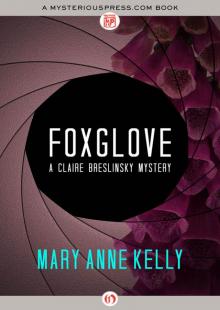 Foxglove
Foxglove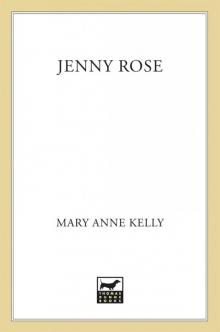 Jenny Rose
Jenny Rose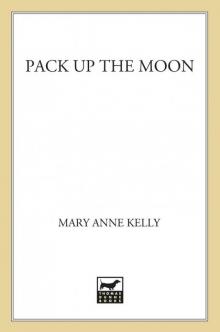 Pack Up the Moon
Pack Up the Moon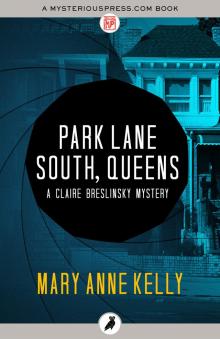 Park Lane South, Queens
Park Lane South, Queens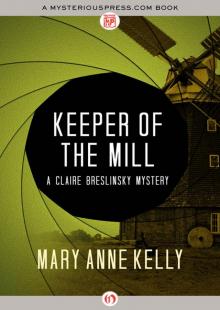 Keeper of the Mill
Keeper of the Mill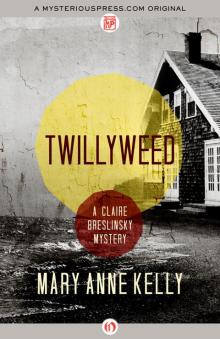 Twillyweed
Twillyweed